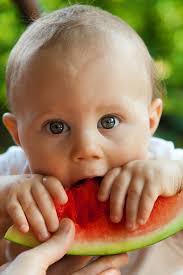 My 1-year-old is an impressive eater. During recent holiday family gatherings, he provided regular entertainment as he sat at the table devouring near-adult-size portions of a variety of foods. Commentary ranged from “Wow, where does it all go?” “But he has such a tiny stomach!” And inevitably, the (well-intentioned, I’m sure) “so… you just let him eat as much as he wants?” Perhaps counter-intuitively, parental feeding restriction, or exerting more control over what and how much the child is eating, is associated with overeating and obesity later in childhood. Infants and young children are innately able to regulate their energy intake. However, they are better able to respond to internal hunger and satiety signals when they are not distracted by external signals, such as encouragement to eat a certain amount or receiving preferred foods as a reward. If the parents exert too much influence over their child’s food intake or feeding experience, the child doesn’t learn to self-regulate. In addition, when caregivers regularly restrict access to highly desirable foods, children tend to have stronger preferences for these foods and eat more when the foods are freely available to them. Restriction, while intended to reduce intake of foods categorized by parents as “bad” or “unhealthy”, can actually have the opposite effect. Children become hyper-focused on the restricted foods and will then overeat when finally given access to them.
This research seems to suggest that allowing children to choose their own foods and intake amounts will help them to maintain a healthy weight as they get older. However, these findings have an interesting twist, known in epidemiology as confounding. While children with restricted food intake are more likely to be overweight later on, this relationship may actually result from the effect of a third factor – the child’s weight status at the time of feeding restriction. This is because parents may be more likely to restrict food intake if their infant or toddler is already overweight – and overweight infants and toddlers are more likely to become overweight children and adults. Project Viva researchers used data on 837 mother-infant pairs to examine maternal feeding restriction and the child’s weight status at age 1 and BMI at age 3. They found that maternal feeding restriction at age 1 was associated with child BMI at age 3, but the association disappeared after adjusting for the child’s weight-for-length at age 1, the same time that feeding restriction was measured. These results suggest that feeding restriction could predict later overweight due to its association with concurrent weight status. The relationships between caregiver control over children’s food intake, eating behaviors, and weight status are complex. In the absence of clear scientific evidence to support an alternate strategy, I will continue to trust my child’s natural ability to figure out how much he needs to eat while doing my best to encourage a nutritious diet. However, the best method of achieving this is also up for debate. If parents should allow their children to choose their own foods and self-regulate the quantity of food consumed, how can we promote good nutrition and a healthy relationship with food? One factor that does seem to influence children’s food preferences is modeling positive eating behaviors. Not surprisingly, if I want my son to snack on carrot sticks, I should not sit next to him and eat a cookie. I can certainly take a careful look at my own behavior and be aware of the general attitude toward food that my husband and I are promoting. But as I realized the other night watching my son feed his graham crackers to the dog to make more room on his plate for kiwi, his preferred dessert, he seems to be figuring this out pretty well on his own.
0 Comments
Your comment will be posted after it is approved.
Leave a Reply. |
©2017 WeighingInBlog. All rights reserved. 401 Park Drive, Boston, MA




 RSS Feed
RSS Feed

